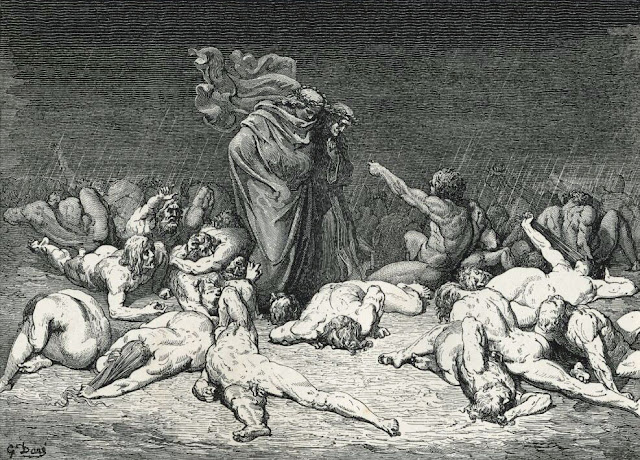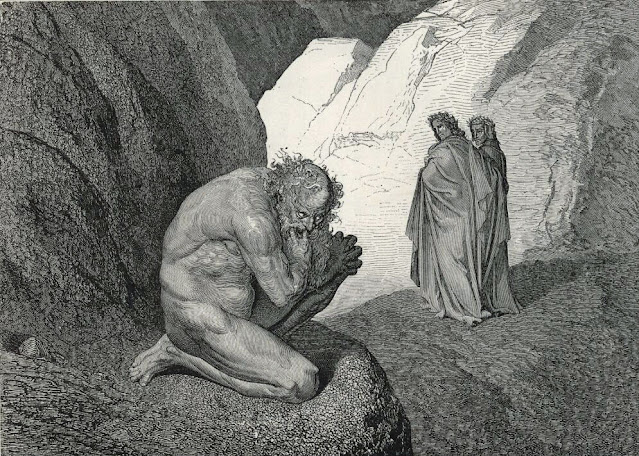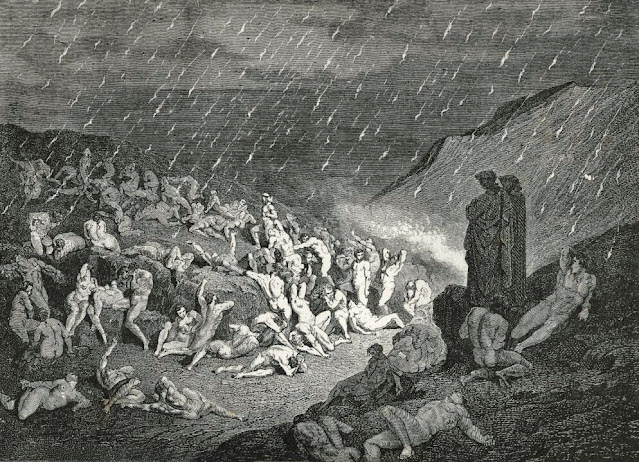Our visual image of Victorian London is largely fixated on its sordidness—cramped streets, dark alleys, desolate slums, overcrowding, and illicit dens. Two people are responsible for creating in our heads such pictures of destitution and filth—one is Charles Dickens, whose works largely revolved around grinding poverty, and the other is French illustrator Gustave Doré. Doré (1832 – 1883) was a prolific engraver, artist, illustrator, and sculptor, who became very popular both in France and England by being an extremely successful illustrator for books and magazine.
He began his career early—at the age of fifteen—working for the French paper Le journal pour rire. Before he was twenty-five, his illustrations had adorned the books of several prominent writers of his time such as Cervantes, Rabelais, Balzac, Milton, Byron, and Dante. His illustrations of Cervantes's Don Quixote left such an indelible impression on the collective imagination of the public that it forever changed how subsequent artists, stage and film directors would represent the various characters in the book in their medium. Doré's illustrations for the English Bible in 1866 was such great success that it earned him a major exhibition of his work in London, eventually leading to the foundation of his very own Dore Gallery.
In 1869, Dore teamed up with journalist Blanchard Jerrold to produce a comprehensive portrait of London. For the next four years, Jerrold and Dore explored the dark underbelly of the largest, most fashionable, and most prosperous city in the world, visiting night refuges, staying in cheap lodging houses and making rounds of the opium den. The duo were often accompanied by plain-clothes policemen. They travelled up and down the river and attended fashionable events at Lambeth Palace, the boat race and the Derby.
Note: Doré produced so much work that I will feature his work in two tranches. This first series features works by Doré from 1847 to 1870. A later series will feature works from 1867 to 1883.
This is part 4 of a 12-part series on the earlier works of Gustave Doré:
1857 Vision of Hell (Dantés Inferno) published by Cassell & Co:
 |
| Front Cover |
 |
| Title Page |
.jpg) |
| Frontispiece |
 |
| In the midway of this our mortal life, I found me in a gloomy wood, astray. |
 |
| Scarce the ascent Beganm when lo! a panther, nimble, light, And cover'd with a speckled skin, appear'd: Noe, when it saw me, vanish'd. |
 |
| A lion came, 'gainst me as it appear'd, With his head held aloft, and hunger-mad. |
 |
| He, soon as he saw that I was weeping, answer'd. |
 |
| Onward he moved, I close his steps pursued. |
 |
| Now was the day departing. |
 |
| I, who now bid thee on the errand forth, Am Beatrice. |
 |
| All hope abandon ye who enter here. |
 |
| And, lo! toward us in a bark Comes on an old man, hoary white with eld, Crying, "Woe to you, wicked spirits!" |
 |
| E'en in like manner Adam's evil brood Cast themselves one by one down from the shore. |
 |
| Only so far afflicted, that we live Desiring without hope. |
 |
| So I beheld united the bright school Of him the monarch of sublimest song, That o'er the others like an eagle soars. |
 |
| There Minos stands. |
 |
| The stormy blast of hell With restless fury drives the spirits on. |
 |
| Bard! Willingly I would address those two together coming, Which seem so light before the wind. |
 |
| Love brought us to one death: Caina waits The soul, who spilt our life. |
 |
| In its leaves that day We read no more. |
 |
| I, through compassion fainting, seem'd not far From death, and like a corse fell to the ground. |
 |
| Then my guide, his palms Expanding on the ground, thence filled with earth Rais'd them, and cast it in his ravenous maw. |
 |
| Thy city heap'd with envy to the brim, Ay that the measure overflows its bounds, Held me in brighter days. Ye citizens Were wont to name me Ciacco. |
 |
| Curs'd wolf! thy fury inward on thyself Prey, and consume thee! |
 |
| Not all the gold, that is beneath the moon, Or ever hath been, of these toil-worn souls Might purchase rest for one. |
 |
| Now seest thou, son! The souls of those, whom anger overcame. |
 |
| Soon as both embark'd, Cutting the waves, goes on the ancient prow, More deeply than with others it is wont. |
 |
| My teacher sage Aware, thrusting him back: "Away! down there, To the' other dogs!" |
 |
| I could not hear what terms he offer'd them, But they conferr'd not long. |
 |
| Mark thou each dire Erinnys. |
 |
| To the gate He came, and with his wand touch'd it, whereat Open without impediment it flew. |
 |
| He answer thus return'd: "The arch-heretics are here, accompanied By every sect their followers" |
 |
| He, soon as there I stood at the tomb's foot, Ey'd me a space, then in disdainful mood Address'd me: "Say, what ancestors were thine?" |
 |
| And there At point of the disparted ridge lay stretch'd The infamy of Crete, detested brood Of the feign'd heifer. |
 |
| One cried from afar: "Say to what pain ye come Condemn'd, who down this steep have journied? |
 |
| We to those beasts, that rapid strode along, Drew near. |
 |
| Here the brute Harpies make their nest. |
 |
| And straight the trunk exclaim'd: "Why pluck'st thou me?" |
 |
| "Haste now," the foremost cried, "now haste thee death!" |
 |
| Unceasing was the play of wretched hands, Now this, now that way glancing, to shake off The heat, still falling fresh. |
 |
| "Sir! Brunetto! And art thou here?" |
 |
| Forthwith that image vile of fraud appear'd. |
 |
| New terror I conceiv'd at the steep plunge. |
 |
| Ah! how they made them bound at the first stripe! |
 |
| "Why greedily thus bendest more on me, Than on these other filthy ones, thy ken?" |
 |
| Thaïs is this, the harlot, whose false lip Answer'd her doting paramour that ask'd, "Thankest me much!" |
 |
| There stood I like the friar, that doth shrive A wretch for murder doom'd. |
 |
| This said, They grappled him with more than hundred hooks. |
 |
| "Be none of you outrageous." |
 |
| In pursuit He therefore sped, exclaiming: "Thou art caught." |
 |
| But the' other proved A goshawk able to rend well his foe: And in the boiling lake both fell. |
 |
| Scarcely had his feet Reach'd to the lowest of the bed beneath, When over us the steep they reach'd. |
 |
| "Tuscan, who visitest The college of the mourning hypocrites, Disdain not to instruct us who thou art." |
 |
| "That pierced spirit, whom intent Thou view'st, was he who gave the Pharisees Counsel, that it were fitting for one man To suffer for the people." |
 |
| Amid this dread exuberance of woe Ran naked spirits wing'd with horrid fear, Nor hope had they of crevice where to hide, Or heliotrope to charm them out of view. |
 |
| The other two Look'd on exclaiming: "Ah, how dost thou change, Agnello!" |
 |
| The guide, who mark'd How I did gaze attentive, thus began: "Within these ardours are the spirits, each Swath'd in confining fire." |
 |
| "Now mark how I do rip me! lo! How is Mohammed mangled!" |
 |
| Call thou to mind Piero of Medicina, if again Returning, thou behold'st the pleasant land That from Vercelli slopes to Mercabò. |
.jpg) |
| By the hair It bore the sever'd member, lantern-wise Pendent in hand, which look'd at us and said, "Woe's me!" Vision of Hell (Dantés Inferno) continues in part 5 of this series. |


No comments:
Post a Comment
Note: only a member of this blog may post a comment.